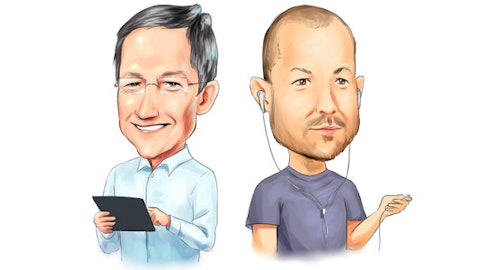Microsoft Corporation (NASDAQ:MSFT) investors have been on quite a ride the past few weeks. CEO Steve Ballmer’s plans to retire within 12 months sent shares up 10% from August’s lows. However, the recent announcement to buy Nokia Corporation (ADR) (NYSE:NOK)‘s handset and services division has seen the market take back all of those gains, while Nokia Corporation (ADR) (NYSE:NOK) shares are up 37%.

And as the Fool’s Jason Moser says in this video, Microsoft Corporation (NASDAQ:MSFT) investors are responding negatively for good reason based on the company’s poor track record with acquisitions, especially in the face of still not having a clear choice for CEO to replace Ballmer. While there is clearly major impact for both of these two companies, the third company in the trio of mobile revolution losers–BlackBerry Ltd (NASDAQ:BBRY) –is still left out in the cold. What does this move mean for BlackBerry Ltd (NASDAQ:BBRY) and its shareholders?
Return to past glory doesn’t look likely
It’s only been a handful of years ago when Nokia Corporation (ADR) (NYSE:NOK) and BlackBerry Ltd (NASDAQ:BBRY)–then called Research in Motion–were at the top of the mobile world. Nokia Corporation (ADR) (NYSE:NOK) was the number one mobile phone maker in the world for most of the 2000s, and the BlackBerry Ltd (NASDAQ:BBRY) was the smartphone, back when that mostly just meant your work email and calendar. IT loved the Fort Knox-like security, and users liked the easy interface, big screen, and real keyboard. But for BlackBerry Ltd (NASDAQ:BBRY), it really came down to its email, and how much better is was at that than anyone else, and BlackBerry Messenger (BBM) for easy on-to-one instant messaging.
But three things happened:
- Everybody else got better at email
- All those apps on the other phones were just more important to more consumers than work email or BBM
- BYOD changed the game
But as to BlackBerry Ltd (NASDAQ:BBRY), it never really embraced-or figured out how to tap-the massive upswell in consumer interest in accessing all of the other things on the web, or the viability of those third party apps. In 2010, the company said it would focus on its corporate customers.
What it didn’t count on, though, was enterprise customer’s concerns about security becoming less of a competitive strength, when executives showed up at the office with an iPhone and told IT to make it work with corporate email. This crack in the IT dam led to the opening of the floodgates, and companies embracing BYOD meant everyone in the company could get connected, and the company didn’t have to buy the hardware.
Here we are, three years later, and BlackBerry’s latest devices, more targeted at (imagine that) consumer interests versus work tools, have failed to draw much consumer interest outside of BlackBerry devotees. Shares are down nearly 39% from January’s high, and the company’s market share is lower than its been in almost a decade. On August 12, the company announced the formation of a special committee that would “explore strategic alternatives to enhance value and increase scale.”
Two wrongs make a right?
The acquisition of Nokia Corporation (ADR) (NYSE:NOK)’s handset business doesn’t, by any means, remove the possibility of Microsoft Corporation (NASDAQ:MSFT) buying BlackBerry. The company should still have around $70 billion in the bank after the Nokia Corporation (ADR) (NYSE:NOK) acquisition, so funding a deal isn’t an issue. The question, of course, is what would this bring to Microsoft Corporation (NASDAQ:MSFT)’s business? There are a couple of benefits:
- BlackBerry’s legacy of enterprise security is still valuable, and actually would pair well with Microsoft Corporation (NASDAQ:MSFT)’s strength in the enterprise.
- Combined with Nokia’s increasingly popular Lumia phones, Microsoft Corporation (NASDAQ:MSFT) could have a full suite of both consumer and enterprise products and “solutions.”
The real challenge would be integrating three very different companies together in a way that actually created value. Frankly, this is a tall order for any company to pull off. And I’m not convinced that Microsoft, with its history of poor acquisitions. The best (or worst) example of this is the $6.3 billion acquisition of aQuantive in 2007, that led to the company taking a $6.2 billion writedown last year.
And while it’s true that non-cash charges like this don’t directly hurt Microsoft’s operations, they are clear evidence that the company is just terrible at leveraging acquisitions. Chances are the Nokia acquisition will end up leading to more write downs in the future. BlackBerry would be more of the same.
Final thoughts
The move to buy Nokia’s handset business could eventually work out for Microsoft. However, history isn’t in Mr. Softy’s favor. A decision to acquire any or all of BlackBerry would just be piling on more confusion in the middle of the search for a CEO. BlackBerry investors could be facing their last real chance to get out with much of anything. The no debt, cash-rich balance sheet is a strength, but lack of profitability and product demand means the well will eventually run dry. Whether it’s Microsoft or another company, BlackBerry needs a suitor.
The article What Does the Microsoft-Nokia Deal Mean For BlackBerry? originally appeared on Fool.com is written by Jason Hall.
Jason Hall owns shares of Apple (NASDAQ:AAPL). The Motley Fool recommends Apple. The Motley Fool owns shares of Apple and Microsoft.
Copyright © 1995 – 2013 The Motley Fool, LLC. All rights reserved. The Motley Fool has a disclosure policy.




